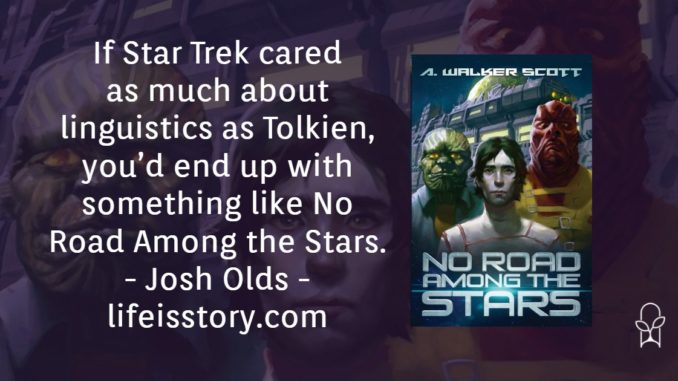
Published by ISC Publishing on June 15, 2018
Buy on Amazon
Goodreads

University student David Asbury trusts no one and wants nothing more than to be left alone to study alien languages. For three years he has managed just that as an undergraduate at Shel Matkei Academy. But his scholarship, which is his only means of support as an orphan, requires him to become a diplomat in the InterStellar Commonwealth.
Now he's on a team of aliens learning how to broker peace treaties and trade deals. Some of them hate him. Some just think he's strange. And one won't let him hide away and waste his life.
Just when David decides there's reason to hope for a better future in this world of codes and customs, everything falls apart.
More alone than ever, David now has to fight his way to justice, with all the odds, and some very powerful aliens, arrayed against him. But even solving the mystery of who is responsible may not be enough to put the pieces of David's life back together.
If Star Trek cared as much about linguistics as Tolkien, you’d end with something like No Road Among the Stars. A. Walker Scott’s stunning debut novel is a deeply immersive journey into a vast world of peoples, languages, and cultures, all exquisitely crafted with knowledge and nuance. Scott takes readers into the world of Shel Matkei Academy, a Starfleet of sorts, where the best and brightest of all beings study for their eventual careers. David Asbury is a human (from Texas, because of course) whose ability to learn languages and cultures is unparalleled. When thrown into a pod—a year-long project for diplomacy students that functions as a simulated nation—he must call on all his skills to bring success to his team. But then, things turn deadly. For real.
No Road Among the Stars spends most of its time wending and winding through Scott’s incredibly realized fantasy world. There’s a lot of settling in, as you’re slowly introduced to the various characters, their languages, and their cultures. Each character and each culture are well thought out, nuanced, and believable. The primary problem with most novels of this nature is that the amount of information given is overwhelming. The story becomes too alien, not giving the reader any bit of familiarity. And when a reader cannot engage with the story, or when the barrier for meaningful engagement is too high—well, it makes for a boring book. No Road Among the Stars is not a boring book. Well…not for these reasons. While the pacing lags in the first half of the novel (there’s no real action until about 65% of the way through), Scott manages to make the so-called boring parts not boring at all.
Scott’s constructed languages and cultures work. They’re believable. They’re understandable without being stereotypical. They have depth, but there’s a shallow end and you slowly wade into deeper waters. The languages of No Road Among the Stars fit the beings they’re given and make intuitive sense. They read like real foreign languages, not fantasy gobbledygook. It this detail that makes the slow pace worth it.
The weakness in the book is the pacing. There’s so much world-building that the central narrative isn’t developed until late in the book and it gets wrapped up much too quickly. It’s almost like a bit after halfway through Scott realized there needed to be a story amid all the world-building. My advice would be this: when you write a world this well, the world-building is the story. Life is story, after all. And the friendships, the cultural misunderstandings, the small arguments, the missed social cues—it’s those little stories that we can call identify with.
Not that the action is bad. I won’t spoil it, but Scott weaves a serviceable if perfunctory mystery into the plot, using it to drive the main character forward. It’s an expected storyline, good within the genre. And No Road Among the Stars is about average in the areas it tries to meet expectations. In the areas it tries to be unique? That’s where it shines. No Road Among the Stars is a uniquely satisfying novel and if you’ve a love of languages, then even more so.
